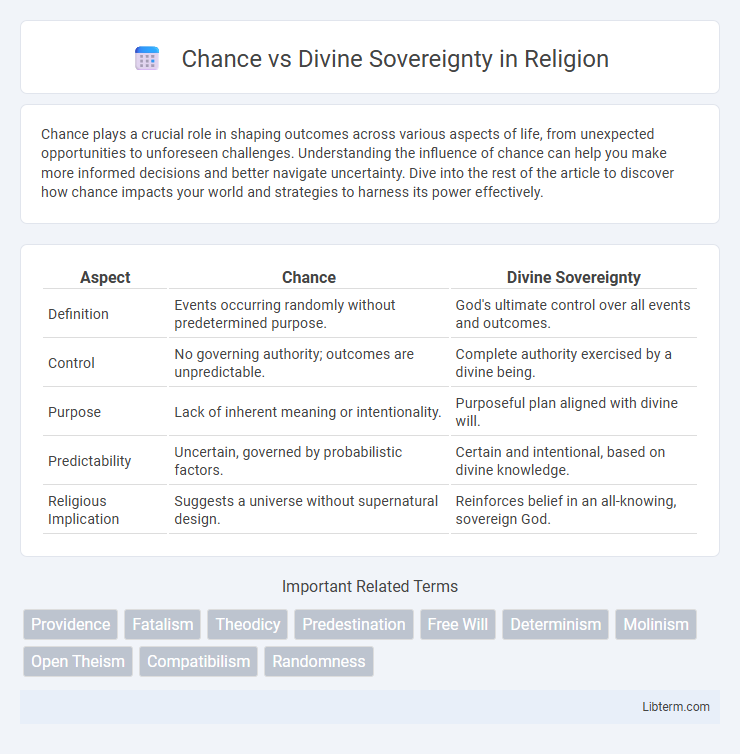Chance plays a crucial role in shaping outcomes across various aspects of life, from unexpected opportunities to unforeseen challenges. Understanding the influence of chance can help you make more informed decisions and better navigate uncertainty. Dive into the rest of the article to discover how chance impacts your world and strategies to harness its power effectively.
Table of Comparison
| Aspect | Chance | Divine Sovereignty |
|---|---|---|
| Definition | Events occurring randomly without predetermined purpose. | God's ultimate control over all events and outcomes. |
| Control | No governing authority; outcomes are unpredictable. | Complete authority exercised by a divine being. |
| Purpose | Lack of inherent meaning or intentionality. | Purposeful plan aligned with divine will. |
| Predictability | Uncertain, governed by probabilistic factors. | Certain and intentional, based on divine knowledge. |
| Religious Implication | Suggests a universe without supernatural design. | Reinforces belief in an all-knowing, sovereign God. |
Understanding the Concepts: Chance and Divine Sovereignty
Chance refers to random occurrences without apparent cause or purpose, often associated with probability and unpredictability in events. Divine Sovereignty denotes the supreme authority and control of a deity over all creation, implying that all events unfold according to a divine plan or will. Understanding the interplay between chance and divine sovereignty involves examining whether seemingly random events are part of a purposeful, sovereign order.
Historical Perspectives on Fate and Divine Control
Historical perspectives on fate and divine control reveal a complex interplay between chance and divine sovereignty across cultures. Ancient Greek philosophy introduced the concept of Moirai, where fate governed human destiny beyond divine interference, while in Judeo-Christian traditions, divine sovereignty emphasized God's ultimate control over all events. Medieval scholastics reconciled fate and free will by affirming that divine omniscience encompasses chance occurrences without negating human agency.
Philosophical Interpretations of Randomness vs. Providence
Philosophical interpretations of chance versus divine sovereignty explore the tension between randomness in events and purposeful providence guiding the universe. Chance denotes unpredictable occurrences without intrinsic order, reflecting existentialist and naturalistic views that emphasize indeterminacy and free will. Divine sovereignty posits an omnipotent deity orchestrating all outcomes with intentionality, asserting that apparent randomness ultimately serves a higher, coherent divine plan.
Theological Views on Divine Sovereignty
Theological views on divine sovereignty emphasize God's absolute control and providence over all events, asserting that nothing occurs outside His will or knowledge. This perspective holds that apparent chance or randomness is ultimately governed by God's purposeful design, integrating human free will within His sovereign plan. Scholars debate the extent to which divine sovereignty coexists with human freedom, highlighting varying interpretations within Reformed, Arminian, and Catholic traditions.
Science and the Role of Probability
Science relies heavily on probability theory to analyze random events and predict outcomes, emphasizing chance as a fundamental aspect of natural processes. Divine sovereignty, in contrast, posits that all occurrences are preordained by a higher power, challenging interpretations of randomness in quantum mechanics and cosmology. Reconciling chance with divine control involves exploring the limits of scientific models and philosophical perspectives on causality and determinism.
Human Free Will in the Context of Chance and Sovereignty
Human free will operates within the tension between chance and divine sovereignty, where chance represents randomness in events and divine sovereignty signifies God's supreme control over all outcomes. The coexistence of free will suggests that individuals make meaningful choices, even though divine sovereignty ensures the ultimate fulfillment of divine purposes. This dynamic framework balances human responsibility with theological doctrines of predestination and providence.
Religious Texts: Interpreting Events as Chance or Divine Will
Religious texts often present events as manifestations of divine sovereignty, interpreting occurrences not as random chance but as purposeful acts ordained by a higher power. Passages from scriptures like the Bible and Quran emphasize God's control over fate, framing seemingly coincidental events as integral components of a divine plan. This theological perspective shapes believers' understanding of life's uncertainties, reinforcing faith in a purposeful universe governed by spiritual authority rather than randomness.
Practical Implications: Decision-Making and Belief
Belief in divine sovereignty shapes decision-making by fostering trust in a purposeful plan, encouraging patience and reliance on faith during uncertainty. Conversely, viewing outcomes as chance-driven promotes proactive risk assessment and personal responsibility, emphasizing adaptability. Balancing these perspectives influences ethical choices and resilience in facing life's unpredictabilities.
Balancing Faith, Reason, and the Unknown
The interplay between chance and divine sovereignty challenges believers to balance faith in a purposeful divine plan with the acknowledgment of uncertainty and randomness in life's events. Reason guides the understanding that not all occurrences are predictable, encouraging a thoughtful acceptance of the unknown while maintaining trust in a higher power's overarching control. This balance fosters a dynamic faith that embraces mystery without abandoning rational reflection on life's unpredictable nature.
Contemporary Debates: Is Life Random or Divinely Orchestrated?
Contemporary debates on chance versus divine sovereignty explore whether life's events occur through random probabilities or intentional divine orchestration, often engaging theologians, philosophers, and scientists in dialogue. Quantum mechanics introduces inherent randomness at a subatomic level, challenging deterministic views and prompting discussions about God's role in guiding or permitting chance. Theological perspectives vary from strict predestination, where every event is divinely planned, to open theism, which allows for human free will and genuine randomness within God's sovereign framework.
Chance Infographic

 libterm.com
libterm.com